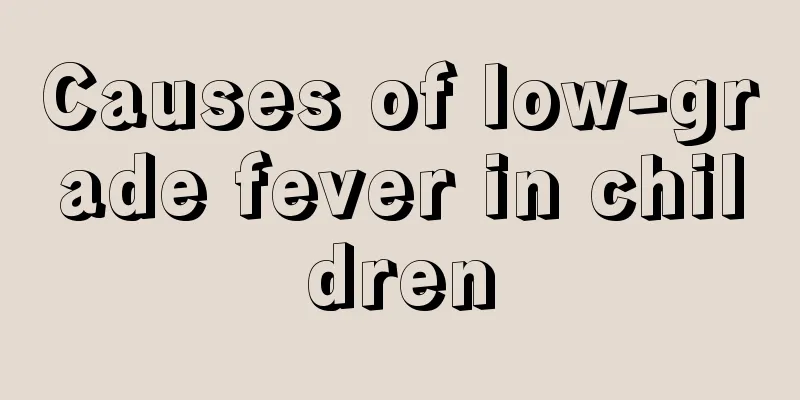Why does a child sweat on his head when sleeping at night?

|
We all know that sweating is actually a nerve reflex in the body. But for children's sweating. Many parents will take it more seriously. Especially when the child's head sweats while sleeping at night. Parents worry endlessly. However, in fact, children are in the development stage, so their body metabolism will be more vigorous. As for physiological excessive sweating, it won't be a big problem if parents just adjust and take care of it. So, what is going on when children sweat on their heads when they sleep at night? If parents don’t know, the editor will answer it for you! It is normal for children to sweat, because children's sweat glands are more developed and it is related to their vigorous growth and development. The secretion of sweat glands is controlled by the autonomic nervous system (vagus nerve). After falling asleep, the vagus nerve becomes excited, causing excessive sweating, usually more on the head and face, but it will subside within one or two hours after falling asleep. This does not require treatment. If you keep sweating after sleeping and the amount is quite heavy, it may be caused by calcium deficiency, so it is best to check whether it is calcium deficiency. This requires calcium and vitamin D supplementation. Countermeasures: Parents need to take good care of babies who sweat a lot, including: (1) Babies should drink more water; (2) Cultivate the baby's ability to adapt to the environment in life, such as wearing loose clothes and not using too thick bedding; (3) Change your baby's clothes frequently, bathe him/her more often, and ensure that his/her skin is clean; (4) Pay attention to education and do not spoil the baby. This is not only beneficial to the baby's mental development, but also can accelerate the improvement of the baby's nervous system regulatory function. In addition, babies who sweat excessively for a long time will lose zinc in their sweat, so they need to consciously increase the intake of zinc-rich foods, such as eggs, meat, liver, beans and peanuts, to meet the zinc needs for their growth and development. If your baby shows symptoms such as anorexia, slow weight and height gain, you should see a doctor and use zinc-containing drugs under the doctor's guidance. Generally, zinc gluconate has fewer side effects and is easier for babies to accept. Note that calcium supplements will prevent the absorption of zinc in the intestines; many babies take various calcium supplements preventively, and zinc supplements should be avoided at the same time as calcium supplements. 2. Babies with rickets and excessive sweating In addition to the baby's physiological hyperhidrosis, hyperhidrosis caused by rickets is also a common cause in infants and young children. Infants and young babies need 400~800IU of vitamin D every day. If they do not get enough sunlight and do not supplement vitamin D food in time, they are likely to suffer from vitamin D deficiency. In addition, babies grow and develop rapidly, so vitamin D deficiency will cause rickets. Babies with rickets will show symptoms of irritability, crying, and restless sleep; they will sweat a lot, especially on the head, but it has nothing to do with climate. In addition to excessive sweating, babies with rickets also have skeletal deformities, such as square skull, wide fontanelle, delayed closure; delayed teething, flared ribs, bracelets or anklets, etc. Babies with rickets and excessive sweating need to treat rickets to solve the problem of excessive sweating. Countermeasures: 1. Vitamin D and calcium treatment must be carried out under the guidance of a doctor, and measures to prevent rickets should be taken after the treatment is completed, such as adding foods rich in calcium and vitamin D to the baby, such as egg yolks, animal livers, dairy products, etc.; 2. Make sure your baby gets more sun exposure. Babies under 2 years old should take 400 IU of vitamin D and about 600 mg of calcium every day (there are vitamin D preparations and calcium preparations specifically for babies in pharmacies) to meet the needs of rapid growth and development. 3. Other care requirements for babies with rickets and hyperhidrosis are the same as those for babies with physiological hyperhidrosis. The above is the answer to the question "Why do children sweat on their heads when they sleep at night?" Do you understand it clearly? Finally, the editor would like to remind you that if your child sweats while sleeping at night, you should not point a fan at the child immediately. This will make it easier for children to catch a cold. It also has a very bad impact on children's physical health. |
<<: What should I do if my child sweats at night?
>>: What should I do if my child sweats on his back when sleeping at night?
Recommend
Can I use medicine to abort my pregnancy after 28 days?
Generally speaking, the best time for a woman to ...
How to give baby eye drops
Because the baby's retina is not fully develo...
Why do children cry at night?
Some children have problems with nighttime distre...
Surgical nursing of neonatal megacolon
Every parent of a newborn baby hopes that their c...
Newborn baby not sleeping at night
Many parents may find that their children do not ...
What should we pay attention to when children have eye fatigue?
Children nowadays have been exposed to various el...
What is the reason for newborn baby peeling?
The appearance of a newborn not only represents t...
What should I do if my child is losing a lot of hair? What should I eat if my child is losing hair?
In our lives, many children will experience hair ...
What should I do if my baby’s hair is hot? Parents need to understand this knowledge
Every parent is particularly concerned about the ...
What are the symptoms of cataracts in children?
I believe everyone is familiar with cataracts. It...
What to do if your baby coughs every morning
For example, many babies cough every morning, so ...
What are some common sense about children's health care in autumn?
Children grow and develop very quickly, which can...
What are the side effects of nebulization for children?
People often suffer from respiratory diseases, es...
What are the types of telangiectasia in children?
Telangiectasia is a common disease that can affec...
What medicine should be used for children's genital itching
As we all know, gynecological diseases often lead...









